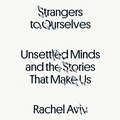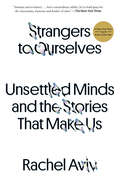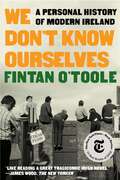Title search results
Showing 1 - 4 of 4 items

We don't know ourselves: A personal history of modern ireland
By Fintan O'Toole. 2022
DAISY audio (CD), DAISY audio (Direct to player), DAISY audio (Zip)
Literature biography, European history, Politics and government biography
Human-narrated audio
In We Don't Know Ourselves, Fintan O'Toole weaves his own experiences into Irish social, cultural, and economic change, showing how…
Ireland, in just one lifetime, has gone from a reactionary "backwater" to an almost totally open society-perhaps the most astonishing national transformation in modern history. Born to a working-class family in the Dublin suburbs, O'Toole served as an altar boy and attended a Christian Brothers school. He was enthralled by American Westerns suddenly appearing on Irish television, which were not that far from his own experience, given that Ireland's main export was beef and it was still not unknown for herds of cattle to clatter down Dublin's streets. Yet the Westerns were a sign of what was to come. O'Toole narrates the once unthinkable collapse of the all-powerful Catholic Church, brought down by scandal and by the activism of ordinary Irish, women in particular. He relates the horrific violence of the Troubles in Northern Ireland, which led most Irish to reject violent nationalism. In O'Toole's telling, America became a lodestar, from John F. Kennedy's 1963 visit, when the American president was welcomed as a native son, to the emergence of the Irish technology sector in the late 1990s, driven by American corporations, which set Ireland on the path toward particular disaster during the 2008 financial crisis
Strangers to Ourselves: Unsettled Minds and the Stories That Make Us
By Rachel Aviv. 2022
DAISY audio (CD), DAISY audio (Direct to player), DAISY audio (Zip)
General non-fiction, Science and medicine biography, Psychology
Human-narrated audio
The highly anticipated debut from the acclaimed award-winning New Yorker writer Rachel Aviv compels us to examine how the stories…
we tell about mental illness shape our sense of who we are.Mental illnesses are often seen as chronic and intractable forces that take over our lives, that define us. But how much do the stories we tell about our illnesses—and the process of diagnosis—inform their course? In Strangers to Ourselves, a powerful and gripping debut, Rachel Aviv writes about how explanations for mental distress may shape our health, our sense of who we are, and the possibilities for who we can be in the world. Drawing on deep, original reporting and unpublished journals and memoirs, Aviv follows an Indian woman, celebrated as a saint, who lived in healing temples in Kerala; an incarcerated mother vying for her children’s forgiveness after a period of psychosis; a man seeking revenge against a prominent psychoanalytic hospital through a lawsuit that dramatizes the clash between two irreconcilable models of the mind; an affluent young woman whose lifelong psychiatric treatment eventually leads her to go off her meds in a desperate attempt to figure out who she would be without them. Animated by a profound sense of empathy, Aviv’s exploration is refracted through her own account of being institutionalized at the age of six and meeting Hava, a friend and fellow patient with whom her life runs parallel—until it no longer does.While the stories unfold in different eras and cultures, they converge in the psychic hinterlands, the outer edges of human experience. Aviv writes about people who have come up against the limits of psychiatric explanations and endeavor to recover a sense of agency, in search of new ways to understand a self in the world. Challenging conventional ideas of mental disease as something static, Aviv's accounts are testaments to the porousness and resilience of the mind.
Strangers to Ourselves: Unsettled Minds and the Stories That Make Us
By Rachel Aviv. 2022
Braille (Contracted), Electronic braille (Contracted), DAISY Audio (CD), DAISY Audio (Direct to Player), DAISY Audio (Zip), DAISY text (Direct to player), DAISY text (Zip), Word (Zip), ePub (Zip)
Science and medicine biography, Psychology, General non-fiction
Synthetic audio, Automated braille
The highly anticipated debut from the acclaimed award-winning New Yorker writer Rachel Aviv compels us to examine how the stories…
we tell about mental illness shape our sense of who we are.Strangers to Ourselves poses fundamental questions about how we understand ourselves in periods of crisis and distress. Drawing on deep, original reporting as well as unpublished journals and memoirs, Rachel Aviv writes about people who have come up against the limits of psychiatric explanations for who they are. She follows an Indian woman celebrated as a saint who lives in healing temples in Kerala; an incarcerated mother vying for her children's forgiveness after recovering from psychosis; a man who devotes his life to seeking revenge upon his psychoanalysts; and an affluent young woman who, after a decade of defining herself through her diagnosis, decides to go off her meds because she doesn't know who she is without them. Animated by a profound sense of empathy, Aviv's gripping exploration is refracted through her own account of living in a hospital ward at the age of six and meeting a fellow patient with whom her life runs parallel—until it no longer does.Aviv asks how the stories we tell about mental disorders shape their course in our lives—and our identities, too. Challenging the way we understand and talk about illness, her account is a testament to the porousness and resilience of the mind.
We Don't Know Ourselves: A Personal History of Modern Ireland
By Fintan O'Toole. 2021
Braille (Contracted), Electronic braille (Contracted), DAISY Audio (CD), DAISY Audio (Direct to Player), DAISY Audio (Zip), DAISY text (Direct to player), DAISY text (Zip), Word (Zip), ePub (Zip)
Literature biography, Politics and government biography, European history, Politics and government
Synthetic audio, Automated braille
NEW YORK TIMES BESTSELLER NEW YORK TIMES • 10 BEST BOOKS OF THE YEAR NATIONAL BESTSELLER The Atlantic: 10 Best…
Books of 2022 Best Books of the Year: Washington Post, New Yorker, Salon, Foreign Affairs, New Statesman, Chicago Public Library, Vroman's “[L]ike reading a great tragicomic Irish novel.” —James Wood, The New Yorker “Masterful . . . astonishing.” —Cullen Murphy, The Atlantic "A landmark history . . . Leavened by the brilliance of O'Toole's insights and wit.” —Claire Messud, Harper’s Winner • 2021 An Post Irish Book Award — Nonfiction Book of the Year • from the judges: “The most remarkable Irish nonfiction book I’ve read in the last 10 years”; “[A] book for the ages.” A celebrated Irish writer’s magisterial, brilliantly insightful chronicle of the wrenching transformations that dragged his homeland into the modern world. Fintan O’Toole was born in the year the revolution began. It was 1958, and the Irish government—in despair, because all the young people were leaving—opened the country to foreign investment and popular culture. So began a decades-long, ongoing experiment with Irish national identity. In We Don’t Know Ourselves, O’Toole, one of the Anglophone world’s most consummate stylists, weaves his own experiences into Irish social, cultural, and economic change, showing how Ireland, in just one lifetime, has gone from a reactionary “backwater” to an almost totally open society—perhaps the most astonishing national transformation in modern history. Born to a working-class family in the Dublin suburbs, O’Toole served as an altar boy and attended a Christian Brothers school, much as his forebears did. He was enthralled by American Westerns suddenly appearing on Irish television, which were not that far from his own experience, given that Ireland’s main export was beef and it was still not unknown for herds of cattle to clatter down Dublin’s streets. Yet the Westerns were a sign of what was to come. O’Toole narrates the once unthinkable collapse of the all-powerful Catholic Church, brought down by scandal and by the activism of ordinary Irish, women in particular. He relates the horrific violence of the Troubles in Northern Ireland, which led most Irish to reject violent nationalism. In O’Toole’s telling, America became a lodestar, from John F. Kennedy’s 1963 visit, when the soon-to-be martyred American president was welcomed as a native son, to the emergence of the Irish technology sector in the late 1990s, driven by American corporations, which set Ireland on the path toward particular disaster during the 2008 financial crisis. A remarkably compassionate yet exacting observer, O’Toole in coruscating prose captures the peculiar Irish habit of “deliberate unknowing,” which allowed myths of national greatness to persist even as the foundations were crumbling. Forty years in the making, We Don’t Know Ourselves is a landmark work, a memoir and a national history that ultimately reveals how the two modes are entwined for all of us.